A Case Note on Company Law: Maidment v Attwood & Ors. Unfair Prejudice Claims Against Directors of Companies
VerifiedAdded on 2023/03/23
|16
|4798
|29
AI Summary
This case note discusses the case of Maidment v Attwood & Ors, which deals with unfair prejudice claims against directors of companies. It examines the facts of the case, the issues before the court, the judgments, and the general impact of the case. The article also explores how courts determine directors' excessive remuneration and how shareholders can make a claim to recoup such during creditors' voluntary liquidation. Additionally, it discusses how courts assess unfair prejudice and how it differs from derivative action remedies.
Contribute Materials
Your contribution can guide someone’s learning journey. Share your
documents today.
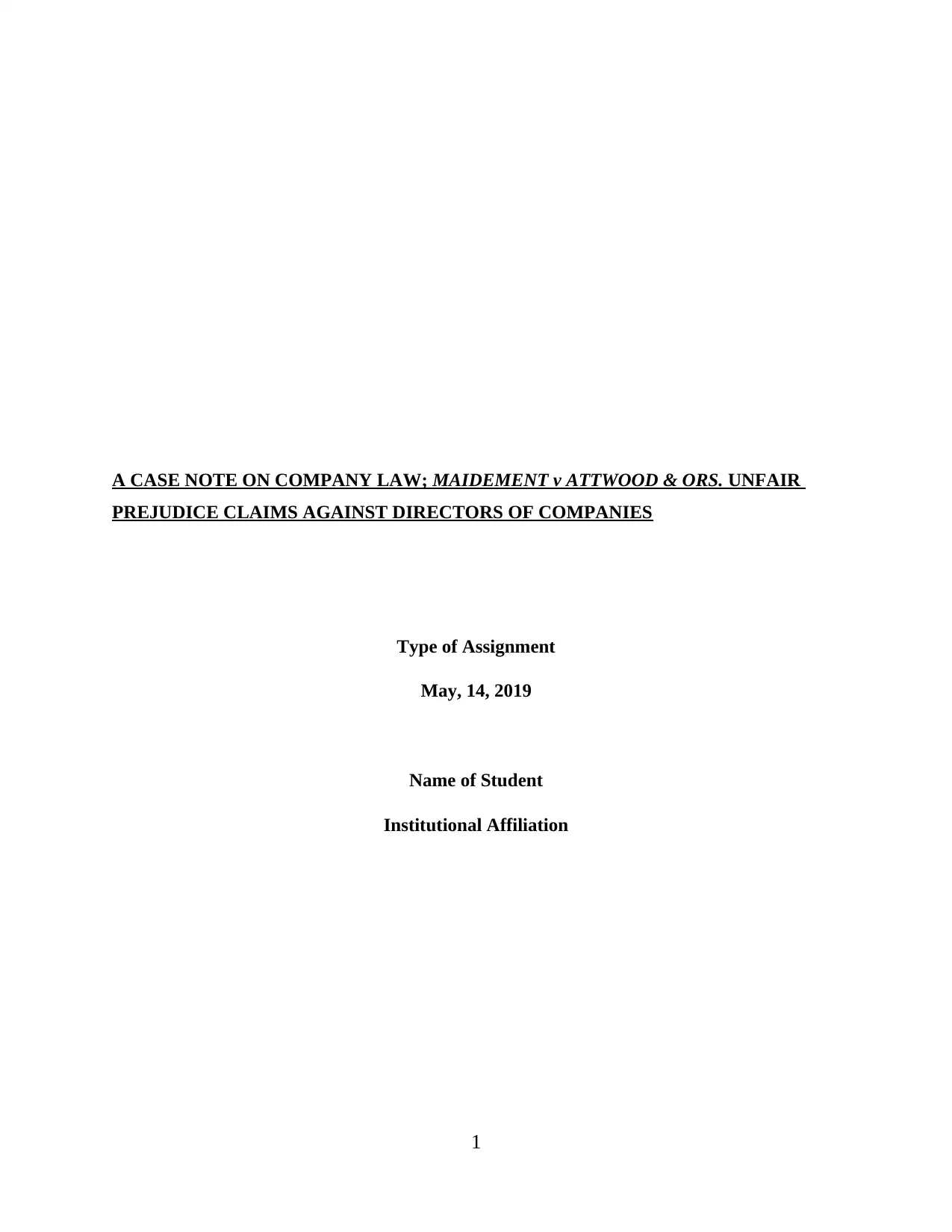
A CASE NOTE ON COMPANY LAW; MAIDEMENT v ATTWOOD & ORS. UNFAIR
PREJUDICE CLAIMS AGAINST DIRECTORS OF COMPANIES
Type of Assignment
May, 14, 2019
Name of Student
Institutional Affiliation
1
PREJUDICE CLAIMS AGAINST DIRECTORS OF COMPANIES
Type of Assignment
May, 14, 2019
Name of Student
Institutional Affiliation
1
Secure Best Marks with AI Grader
Need help grading? Try our AI Grader for instant feedback on your assignments.
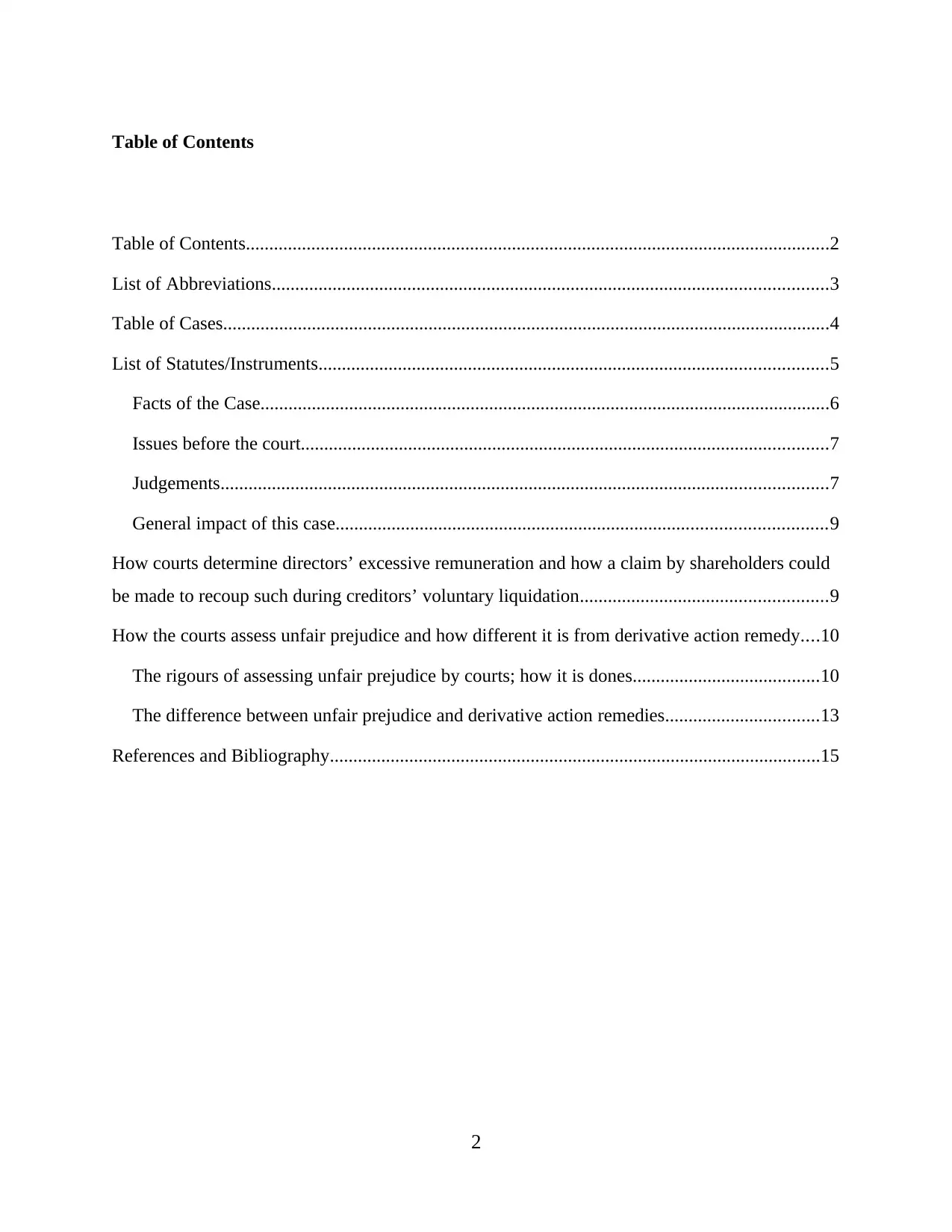
Table of Contents
Table of Contents.............................................................................................................................2
List of Abbreviations.......................................................................................................................3
Table of Cases..................................................................................................................................4
List of Statutes/Instruments.............................................................................................................5
Facts of the Case..........................................................................................................................6
Issues before the court.................................................................................................................7
Judgements..................................................................................................................................7
General impact of this case.........................................................................................................9
How courts determine directors’ excessive remuneration and how a claim by shareholders could
be made to recoup such during creditors’ voluntary liquidation.....................................................9
How the courts assess unfair prejudice and how different it is from derivative action remedy....10
The rigours of assessing unfair prejudice by courts; how it is dones........................................10
The difference between unfair prejudice and derivative action remedies.................................13
References and Bibliography.........................................................................................................15
2
Table of Contents.............................................................................................................................2
List of Abbreviations.......................................................................................................................3
Table of Cases..................................................................................................................................4
List of Statutes/Instruments.............................................................................................................5
Facts of the Case..........................................................................................................................6
Issues before the court.................................................................................................................7
Judgements..................................................................................................................................7
General impact of this case.........................................................................................................9
How courts determine directors’ excessive remuneration and how a claim by shareholders could
be made to recoup such during creditors’ voluntary liquidation.....................................................9
How the courts assess unfair prejudice and how different it is from derivative action remedy....10
The rigours of assessing unfair prejudice by courts; how it is dones........................................10
The difference between unfair prejudice and derivative action remedies.................................13
References and Bibliography.........................................................................................................15
2

List of Abbreviations
UK – United Kingdom
US – United States
Ltd- Limited
3
UK – United Kingdom
US – United States
Ltd- Limited
3
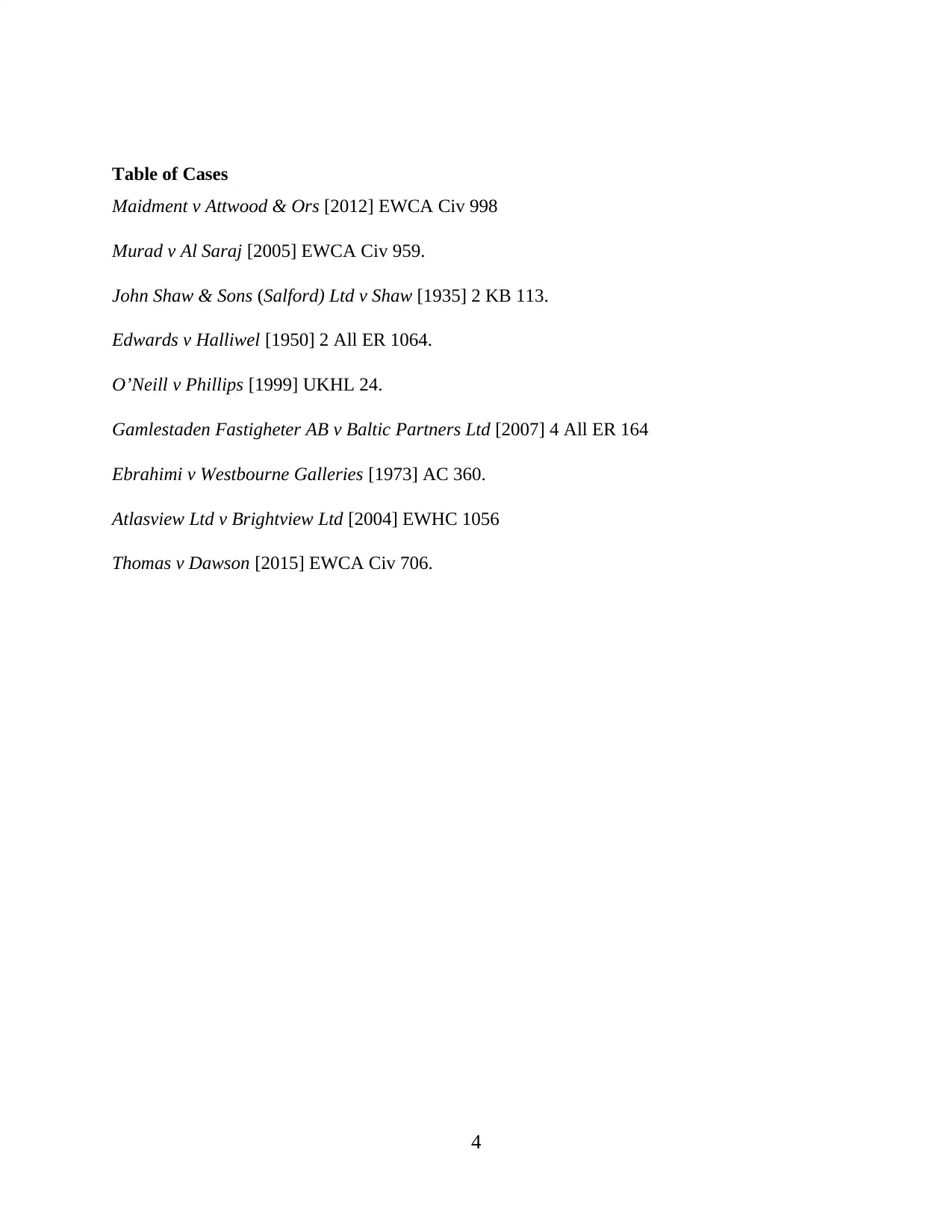
Table of Cases
Maidment v Attwood & Ors [2012] EWCA Civ 998
Murad v Al Saraj [2005] EWCA Civ 959.
John Shaw & Sons (Salford) Ltd v Shaw [1935] 2 KB 113.
Edwards v Halliwel [1950] 2 All ER 1064.
O’Neill v Phillips [1999] UKHL 24.
Gamlestaden Fastigheter AB v Baltic Partners Ltd [2007] 4 All ER 164
Ebrahimi v Westbourne Galleries [1973] AC 360.
Atlasview Ltd v Brightview Ltd [2004] EWHC 1056
Thomas v Dawson [2015] EWCA Civ 706.
4
Maidment v Attwood & Ors [2012] EWCA Civ 998
Murad v Al Saraj [2005] EWCA Civ 959.
John Shaw & Sons (Salford) Ltd v Shaw [1935] 2 KB 113.
Edwards v Halliwel [1950] 2 All ER 1064.
O’Neill v Phillips [1999] UKHL 24.
Gamlestaden Fastigheter AB v Baltic Partners Ltd [2007] 4 All ER 164
Ebrahimi v Westbourne Galleries [1973] AC 360.
Atlasview Ltd v Brightview Ltd [2004] EWHC 1056
Thomas v Dawson [2015] EWCA Civ 706.
4
Secure Best Marks with AI Grader
Need help grading? Try our AI Grader for instant feedback on your assignments.

List of Statutes/Instruments
The Companies Act 2006.
5
The Companies Act 2006.
5
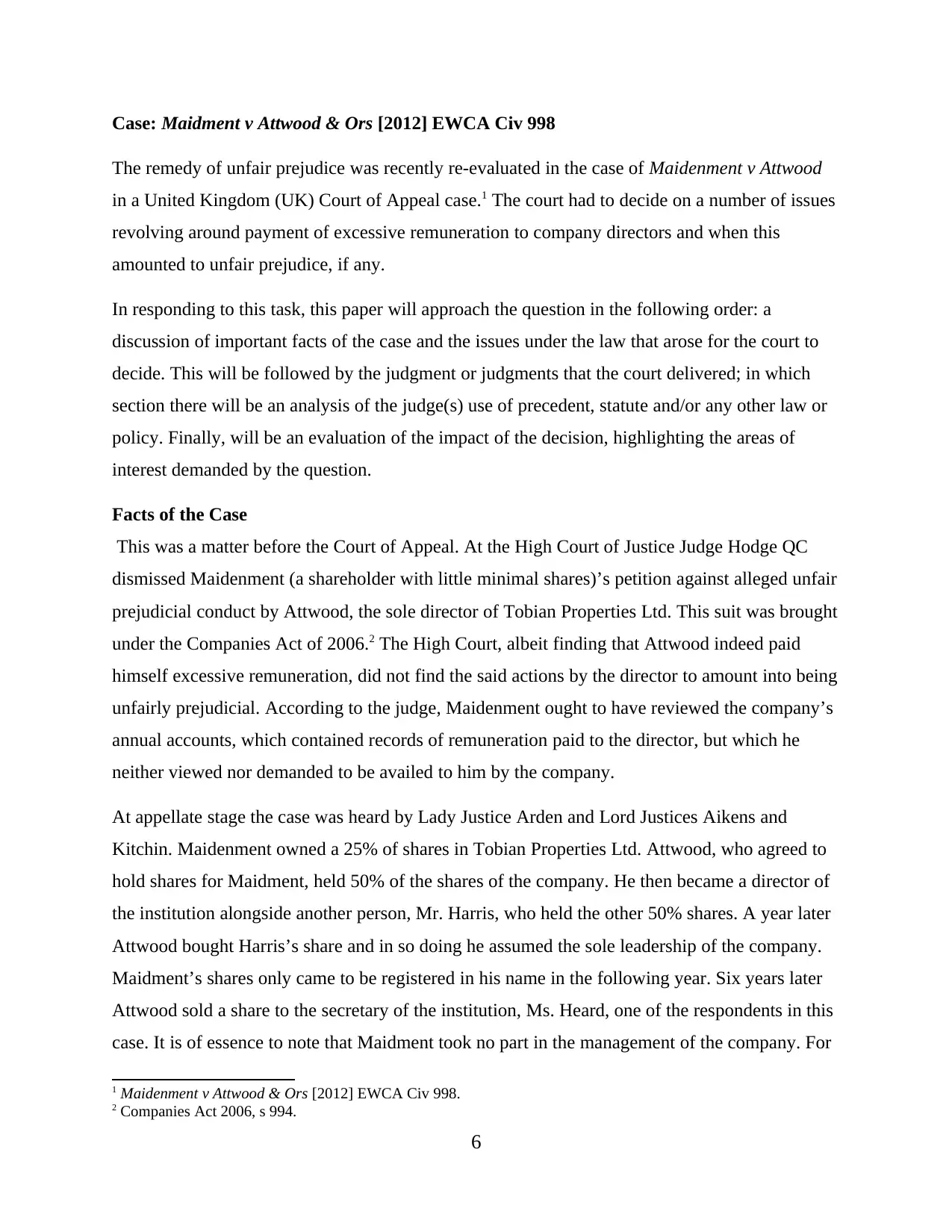
Case: Maidment v Attwood & Ors [2012] EWCA Civ 998
The remedy of unfair prejudice was recently re-evaluated in the case of Maidenment v Attwood
in a United Kingdom (UK) Court of Appeal case.1 The court had to decide on a number of issues
revolving around payment of excessive remuneration to company directors and when this
amounted to unfair prejudice, if any.
In responding to this task, this paper will approach the question in the following order: a
discussion of important facts of the case and the issues under the law that arose for the court to
decide. This will be followed by the judgment or judgments that the court delivered; in which
section there will be an analysis of the judge(s) use of precedent, statute and/or any other law or
policy. Finally, will be an evaluation of the impact of the decision, highlighting the areas of
interest demanded by the question.
Facts of the Case
This was a matter before the Court of Appeal. At the High Court of Justice Judge Hodge QC
dismissed Maidenment (a shareholder with little minimal shares)’s petition against alleged unfair
prejudicial conduct by Attwood, the sole director of Tobian Properties Ltd. This suit was brought
under the Companies Act of 2006.2 The High Court, albeit finding that Attwood indeed paid
himself excessive remuneration, did not find the said actions by the director to amount into being
unfairly prejudicial. According to the judge, Maidenment ought to have reviewed the company’s
annual accounts, which contained records of remuneration paid to the director, but which he
neither viewed nor demanded to be availed to him by the company.
At appellate stage the case was heard by Lady Justice Arden and Lord Justices Aikens and
Kitchin. Maidenment owned a 25% of shares in Tobian Properties Ltd. Attwood, who agreed to
hold shares for Maidment, held 50% of the shares of the company. He then became a director of
the institution alongside another person, Mr. Harris, who held the other 50% shares. A year later
Attwood bought Harris’s share and in so doing he assumed the sole leadership of the company.
Maidment’s shares only came to be registered in his name in the following year. Six years later
Attwood sold a share to the secretary of the institution, Ms. Heard, one of the respondents in this
case. It is of essence to note that Maidment took no part in the management of the company. For
1 Maidenment v Attwood & Ors [2012] EWCA Civ 998.
2 Companies Act 2006, s 994.
6
The remedy of unfair prejudice was recently re-evaluated in the case of Maidenment v Attwood
in a United Kingdom (UK) Court of Appeal case.1 The court had to decide on a number of issues
revolving around payment of excessive remuneration to company directors and when this
amounted to unfair prejudice, if any.
In responding to this task, this paper will approach the question in the following order: a
discussion of important facts of the case and the issues under the law that arose for the court to
decide. This will be followed by the judgment or judgments that the court delivered; in which
section there will be an analysis of the judge(s) use of precedent, statute and/or any other law or
policy. Finally, will be an evaluation of the impact of the decision, highlighting the areas of
interest demanded by the question.
Facts of the Case
This was a matter before the Court of Appeal. At the High Court of Justice Judge Hodge QC
dismissed Maidenment (a shareholder with little minimal shares)’s petition against alleged unfair
prejudicial conduct by Attwood, the sole director of Tobian Properties Ltd. This suit was brought
under the Companies Act of 2006.2 The High Court, albeit finding that Attwood indeed paid
himself excessive remuneration, did not find the said actions by the director to amount into being
unfairly prejudicial. According to the judge, Maidenment ought to have reviewed the company’s
annual accounts, which contained records of remuneration paid to the director, but which he
neither viewed nor demanded to be availed to him by the company.
At appellate stage the case was heard by Lady Justice Arden and Lord Justices Aikens and
Kitchin. Maidenment owned a 25% of shares in Tobian Properties Ltd. Attwood, who agreed to
hold shares for Maidment, held 50% of the shares of the company. He then became a director of
the institution alongside another person, Mr. Harris, who held the other 50% shares. A year later
Attwood bought Harris’s share and in so doing he assumed the sole leadership of the company.
Maidment’s shares only came to be registered in his name in the following year. Six years later
Attwood sold a share to the secretary of the institution, Ms. Heard, one of the respondents in this
case. It is of essence to note that Maidment took no part in the management of the company. For
1 Maidenment v Attwood & Ors [2012] EWCA Civ 998.
2 Companies Act 2006, s 994.
6
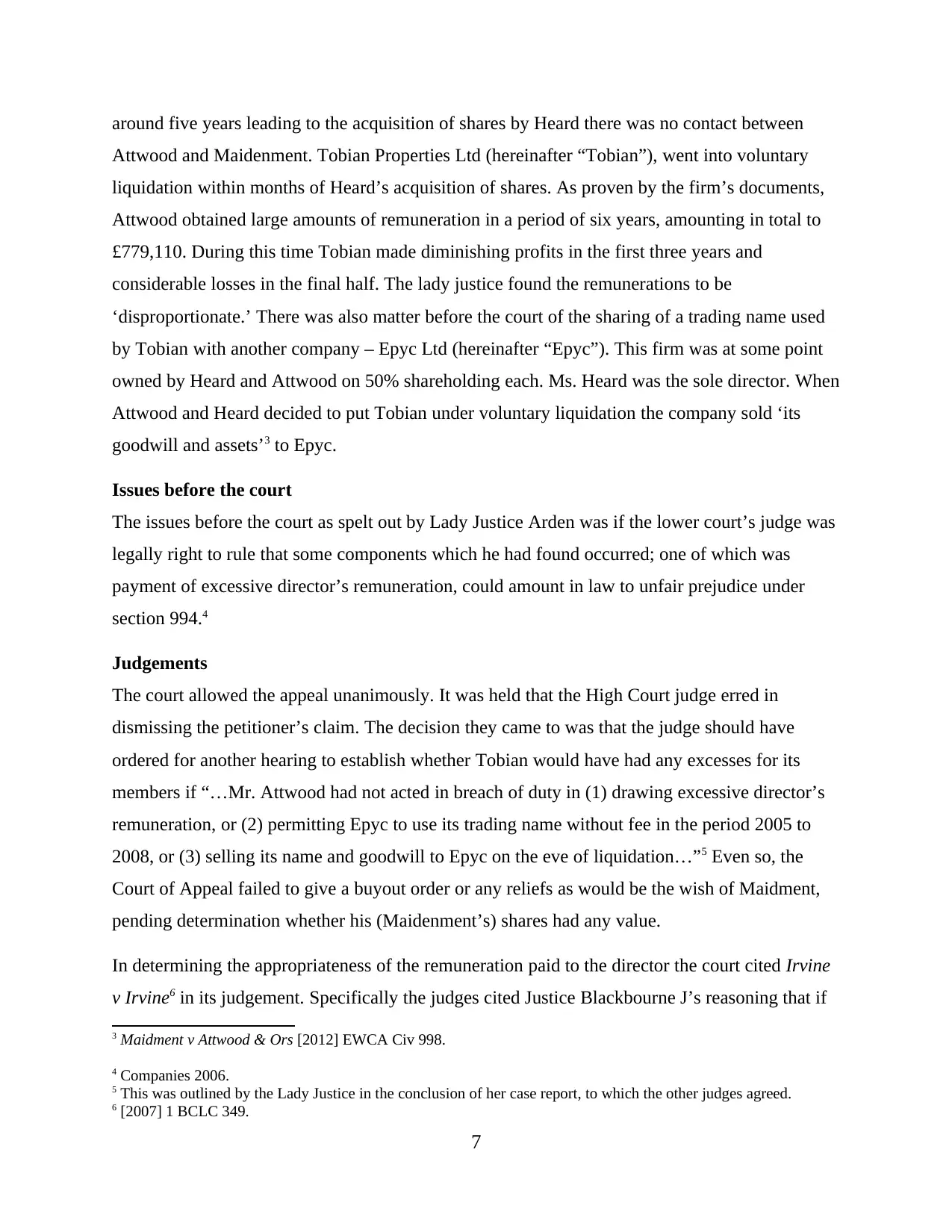
around five years leading to the acquisition of shares by Heard there was no contact between
Attwood and Maidenment. Tobian Properties Ltd (hereinafter “Tobian”), went into voluntary
liquidation within months of Heard’s acquisition of shares. As proven by the firm’s documents,
Attwood obtained large amounts of remuneration in a period of six years, amounting in total to
£779,110. During this time Tobian made diminishing profits in the first three years and
considerable losses in the final half. The lady justice found the remunerations to be
‘disproportionate.’ There was also matter before the court of the sharing of a trading name used
by Tobian with another company – Epyc Ltd (hereinafter “Epyc”). This firm was at some point
owned by Heard and Attwood on 50% shareholding each. Ms. Heard was the sole director. When
Attwood and Heard decided to put Tobian under voluntary liquidation the company sold ‘its
goodwill and assets’3 to Epyc.
Issues before the court
The issues before the court as spelt out by Lady Justice Arden was if the lower court’s judge was
legally right to rule that some components which he had found occurred; one of which was
payment of excessive director’s remuneration, could amount in law to unfair prejudice under
section 994.4
Judgements
The court allowed the appeal unanimously. It was held that the High Court judge erred in
dismissing the petitioner’s claim. The decision they came to was that the judge should have
ordered for another hearing to establish whether Tobian would have had any excesses for its
members if “…Mr. Attwood had not acted in breach of duty in (1) drawing excessive director’s
remuneration, or (2) permitting Epyc to use its trading name without fee in the period 2005 to
2008, or (3) selling its name and goodwill to Epyc on the eve of liquidation…”5 Even so, the
Court of Appeal failed to give a buyout order or any reliefs as would be the wish of Maidment,
pending determination whether his (Maidenment’s) shares had any value.
In determining the appropriateness of the remuneration paid to the director the court cited Irvine
v Irvine6 in its judgement. Specifically the judges cited Justice Blackbourne J’s reasoning that if
3 Maidment v Attwood & Ors [2012] EWCA Civ 998.
4 Companies 2006.
5 This was outlined by the Lady Justice in the conclusion of her case report, to which the other judges agreed.
6 [2007] 1 BCLC 349.
7
Attwood and Maidenment. Tobian Properties Ltd (hereinafter “Tobian”), went into voluntary
liquidation within months of Heard’s acquisition of shares. As proven by the firm’s documents,
Attwood obtained large amounts of remuneration in a period of six years, amounting in total to
£779,110. During this time Tobian made diminishing profits in the first three years and
considerable losses in the final half. The lady justice found the remunerations to be
‘disproportionate.’ There was also matter before the court of the sharing of a trading name used
by Tobian with another company – Epyc Ltd (hereinafter “Epyc”). This firm was at some point
owned by Heard and Attwood on 50% shareholding each. Ms. Heard was the sole director. When
Attwood and Heard decided to put Tobian under voluntary liquidation the company sold ‘its
goodwill and assets’3 to Epyc.
Issues before the court
The issues before the court as spelt out by Lady Justice Arden was if the lower court’s judge was
legally right to rule that some components which he had found occurred; one of which was
payment of excessive director’s remuneration, could amount in law to unfair prejudice under
section 994.4
Judgements
The court allowed the appeal unanimously. It was held that the High Court judge erred in
dismissing the petitioner’s claim. The decision they came to was that the judge should have
ordered for another hearing to establish whether Tobian would have had any excesses for its
members if “…Mr. Attwood had not acted in breach of duty in (1) drawing excessive director’s
remuneration, or (2) permitting Epyc to use its trading name without fee in the period 2005 to
2008, or (3) selling its name and goodwill to Epyc on the eve of liquidation…”5 Even so, the
Court of Appeal failed to give a buyout order or any reliefs as would be the wish of Maidment,
pending determination whether his (Maidenment’s) shares had any value.
In determining the appropriateness of the remuneration paid to the director the court cited Irvine
v Irvine6 in its judgement. Specifically the judges cited Justice Blackbourne J’s reasoning that if
3 Maidment v Attwood & Ors [2012] EWCA Civ 998.
4 Companies 2006.
5 This was outlined by the Lady Justice in the conclusion of her case report, to which the other judges agreed.
6 [2007] 1 BCLC 349.
7
Paraphrase This Document
Need a fresh take? Get an instant paraphrase of this document with our AI Paraphraser
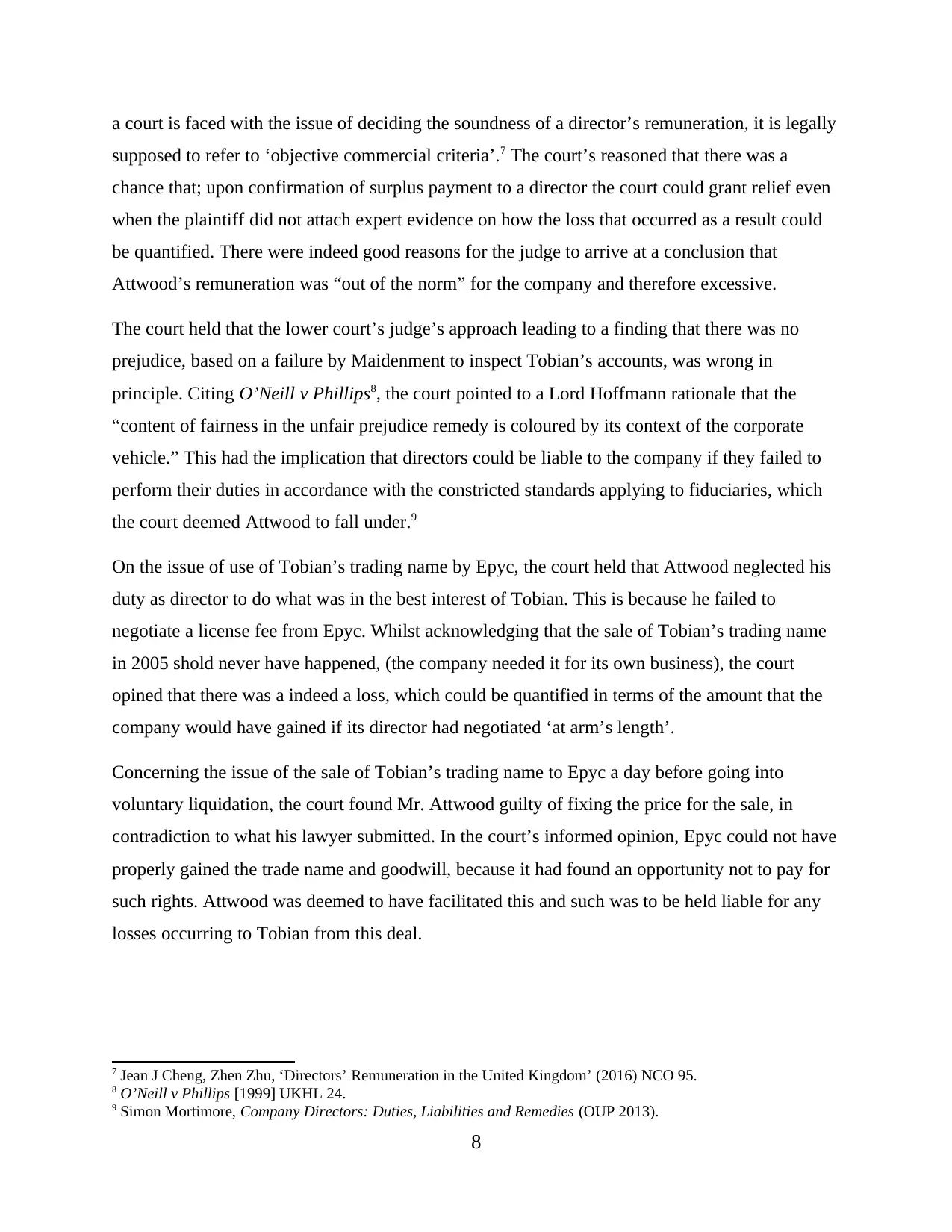
a court is faced with the issue of deciding the soundness of a director’s remuneration, it is legally
supposed to refer to ‘objective commercial criteria’.7 The court’s reasoned that there was a
chance that; upon confirmation of surplus payment to a director the court could grant relief even
when the plaintiff did not attach expert evidence on how the loss that occurred as a result could
be quantified. There were indeed good reasons for the judge to arrive at a conclusion that
Attwood’s remuneration was “out of the norm” for the company and therefore excessive.
The court held that the lower court’s judge’s approach leading to a finding that there was no
prejudice, based on a failure by Maidenment to inspect Tobian’s accounts, was wrong in
principle. Citing O’Neill v Phillips8, the court pointed to a Lord Hoffmann rationale that the
“content of fairness in the unfair prejudice remedy is coloured by its context of the corporate
vehicle.” This had the implication that directors could be liable to the company if they failed to
perform their duties in accordance with the constricted standards applying to fiduciaries, which
the court deemed Attwood to fall under.9
On the issue of use of Tobian’s trading name by Epyc, the court held that Attwood neglected his
duty as director to do what was in the best interest of Tobian. This is because he failed to
negotiate a license fee from Epyc. Whilst acknowledging that the sale of Tobian’s trading name
in 2005 shold never have happened, (the company needed it for its own business), the court
opined that there was a indeed a loss, which could be quantified in terms of the amount that the
company would have gained if its director had negotiated ‘at arm’s length’.
Concerning the issue of the sale of Tobian’s trading name to Epyc a day before going into
voluntary liquidation, the court found Mr. Attwood guilty of fixing the price for the sale, in
contradiction to what his lawyer submitted. In the court’s informed opinion, Epyc could not have
properly gained the trade name and goodwill, because it had found an opportunity not to pay for
such rights. Attwood was deemed to have facilitated this and such was to be held liable for any
losses occurring to Tobian from this deal.
7 Jean J Cheng, Zhen Zhu, ‘Directors’ Remuneration in the United Kingdom’ (2016) NCO 95.
8 O’Neill v Phillips [1999] UKHL 24.
9 Simon Mortimore, Company Directors: Duties, Liabilities and Remedies (OUP 2013).
8
supposed to refer to ‘objective commercial criteria’.7 The court’s reasoned that there was a
chance that; upon confirmation of surplus payment to a director the court could grant relief even
when the plaintiff did not attach expert evidence on how the loss that occurred as a result could
be quantified. There were indeed good reasons for the judge to arrive at a conclusion that
Attwood’s remuneration was “out of the norm” for the company and therefore excessive.
The court held that the lower court’s judge’s approach leading to a finding that there was no
prejudice, based on a failure by Maidenment to inspect Tobian’s accounts, was wrong in
principle. Citing O’Neill v Phillips8, the court pointed to a Lord Hoffmann rationale that the
“content of fairness in the unfair prejudice remedy is coloured by its context of the corporate
vehicle.” This had the implication that directors could be liable to the company if they failed to
perform their duties in accordance with the constricted standards applying to fiduciaries, which
the court deemed Attwood to fall under.9
On the issue of use of Tobian’s trading name by Epyc, the court held that Attwood neglected his
duty as director to do what was in the best interest of Tobian. This is because he failed to
negotiate a license fee from Epyc. Whilst acknowledging that the sale of Tobian’s trading name
in 2005 shold never have happened, (the company needed it for its own business), the court
opined that there was a indeed a loss, which could be quantified in terms of the amount that the
company would have gained if its director had negotiated ‘at arm’s length’.
Concerning the issue of the sale of Tobian’s trading name to Epyc a day before going into
voluntary liquidation, the court found Mr. Attwood guilty of fixing the price for the sale, in
contradiction to what his lawyer submitted. In the court’s informed opinion, Epyc could not have
properly gained the trade name and goodwill, because it had found an opportunity not to pay for
such rights. Attwood was deemed to have facilitated this and such was to be held liable for any
losses occurring to Tobian from this deal.
7 Jean J Cheng, Zhen Zhu, ‘Directors’ Remuneration in the United Kingdom’ (2016) NCO 95.
8 O’Neill v Phillips [1999] UKHL 24.
9 Simon Mortimore, Company Directors: Duties, Liabilities and Remedies (OUP 2013).
8
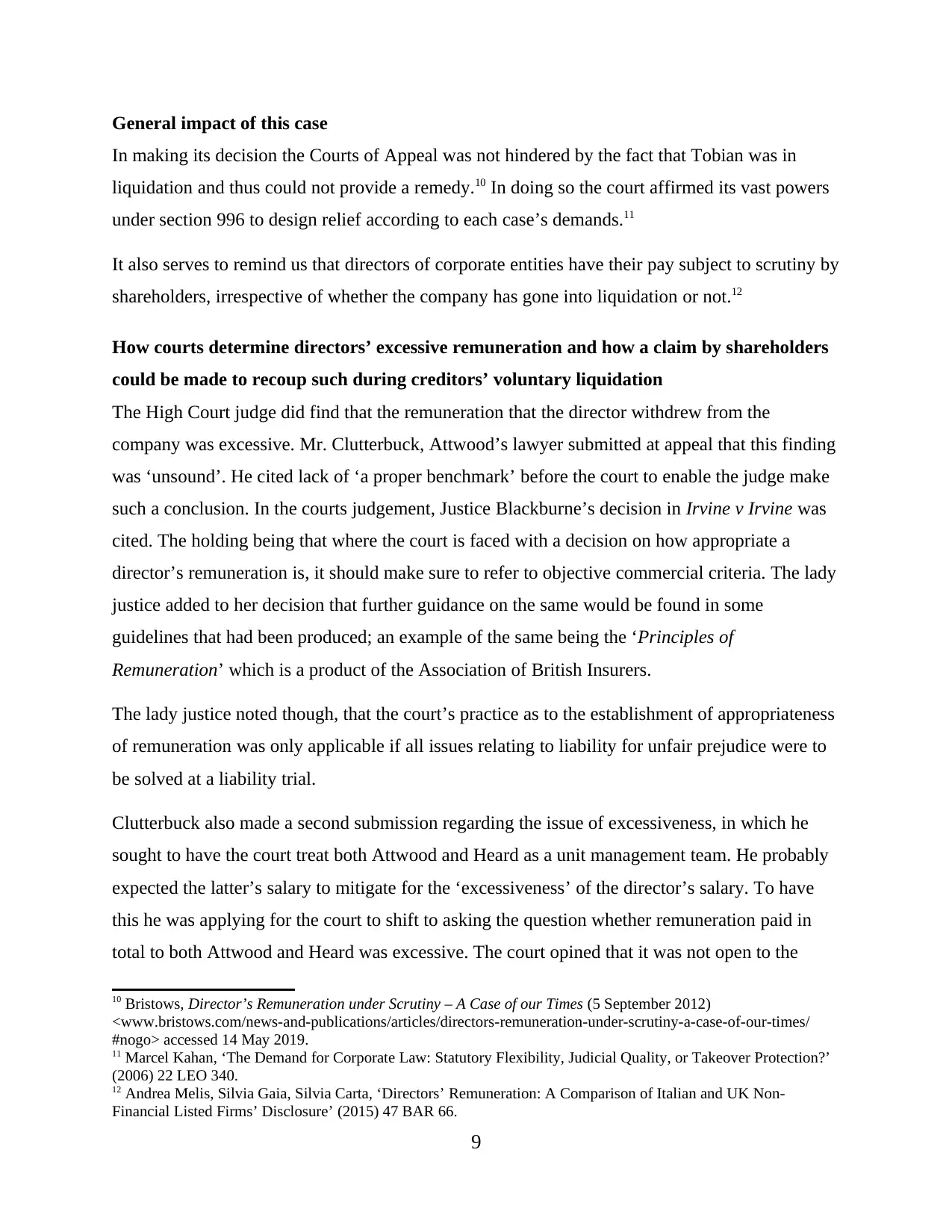
General impact of this case
In making its decision the Courts of Appeal was not hindered by the fact that Tobian was in
liquidation and thus could not provide a remedy.10 In doing so the court affirmed its vast powers
under section 996 to design relief according to each case’s demands.11
It also serves to remind us that directors of corporate entities have their pay subject to scrutiny by
shareholders, irrespective of whether the company has gone into liquidation or not.12
How courts determine directors’ excessive remuneration and how a claim by shareholders
could be made to recoup such during creditors’ voluntary liquidation
The High Court judge did find that the remuneration that the director withdrew from the
company was excessive. Mr. Clutterbuck, Attwood’s lawyer submitted at appeal that this finding
was ‘unsound’. He cited lack of ‘a proper benchmark’ before the court to enable the judge make
such a conclusion. In the courts judgement, Justice Blackburne’s decision in Irvine v Irvine was
cited. The holding being that where the court is faced with a decision on how appropriate a
director’s remuneration is, it should make sure to refer to objective commercial criteria. The lady
justice added to her decision that further guidance on the same would be found in some
guidelines that had been produced; an example of the same being the ‘Principles of
Remuneration’ which is a product of the Association of British Insurers.
The lady justice noted though, that the court’s practice as to the establishment of appropriateness
of remuneration was only applicable if all issues relating to liability for unfair prejudice were to
be solved at a liability trial.
Clutterbuck also made a second submission regarding the issue of excessiveness, in which he
sought to have the court treat both Attwood and Heard as a unit management team. He probably
expected the latter’s salary to mitigate for the ‘excessiveness’ of the director’s salary. To have
this he was applying for the court to shift to asking the question whether remuneration paid in
total to both Attwood and Heard was excessive. The court opined that it was not open to the
10 Bristows, Director’s Remuneration under Scrutiny – A Case of our Times (5 September 2012)
<www.bristows.com/news-and-publications/articles/directors-remuneration-under-scrutiny-a-case-of-our-times/
#nogo> accessed 14 May 2019.
11 Marcel Kahan, ‘The Demand for Corporate Law: Statutory Flexibility, Judicial Quality, or Takeover Protection?’
(2006) 22 LEO 340.
12 Andrea Melis, Silvia Gaia, Silvia Carta, ‘Directors’ Remuneration: A Comparison of Italian and UK Non-
Financial Listed Firms’ Disclosure’ (2015) 47 BAR 66.
9
In making its decision the Courts of Appeal was not hindered by the fact that Tobian was in
liquidation and thus could not provide a remedy.10 In doing so the court affirmed its vast powers
under section 996 to design relief according to each case’s demands.11
It also serves to remind us that directors of corporate entities have their pay subject to scrutiny by
shareholders, irrespective of whether the company has gone into liquidation or not.12
How courts determine directors’ excessive remuneration and how a claim by shareholders
could be made to recoup such during creditors’ voluntary liquidation
The High Court judge did find that the remuneration that the director withdrew from the
company was excessive. Mr. Clutterbuck, Attwood’s lawyer submitted at appeal that this finding
was ‘unsound’. He cited lack of ‘a proper benchmark’ before the court to enable the judge make
such a conclusion. In the courts judgement, Justice Blackburne’s decision in Irvine v Irvine was
cited. The holding being that where the court is faced with a decision on how appropriate a
director’s remuneration is, it should make sure to refer to objective commercial criteria. The lady
justice added to her decision that further guidance on the same would be found in some
guidelines that had been produced; an example of the same being the ‘Principles of
Remuneration’ which is a product of the Association of British Insurers.
The lady justice noted though, that the court’s practice as to the establishment of appropriateness
of remuneration was only applicable if all issues relating to liability for unfair prejudice were to
be solved at a liability trial.
Clutterbuck also made a second submission regarding the issue of excessiveness, in which he
sought to have the court treat both Attwood and Heard as a unit management team. He probably
expected the latter’s salary to mitigate for the ‘excessiveness’ of the director’s salary. To have
this he was applying for the court to shift to asking the question whether remuneration paid in
total to both Attwood and Heard was excessive. The court opined that it was not open to the
10 Bristows, Director’s Remuneration under Scrutiny – A Case of our Times (5 September 2012)
<www.bristows.com/news-and-publications/articles/directors-remuneration-under-scrutiny-a-case-of-our-times/
#nogo> accessed 14 May 2019.
11 Marcel Kahan, ‘The Demand for Corporate Law: Statutory Flexibility, Judicial Quality, or Takeover Protection?’
(2006) 22 LEO 340.
12 Andrea Melis, Silvia Gaia, Silvia Carta, ‘Directors’ Remuneration: A Comparison of Italian and UK Non-
Financial Listed Firms’ Disclosure’ (2015) 47 BAR 66.
9
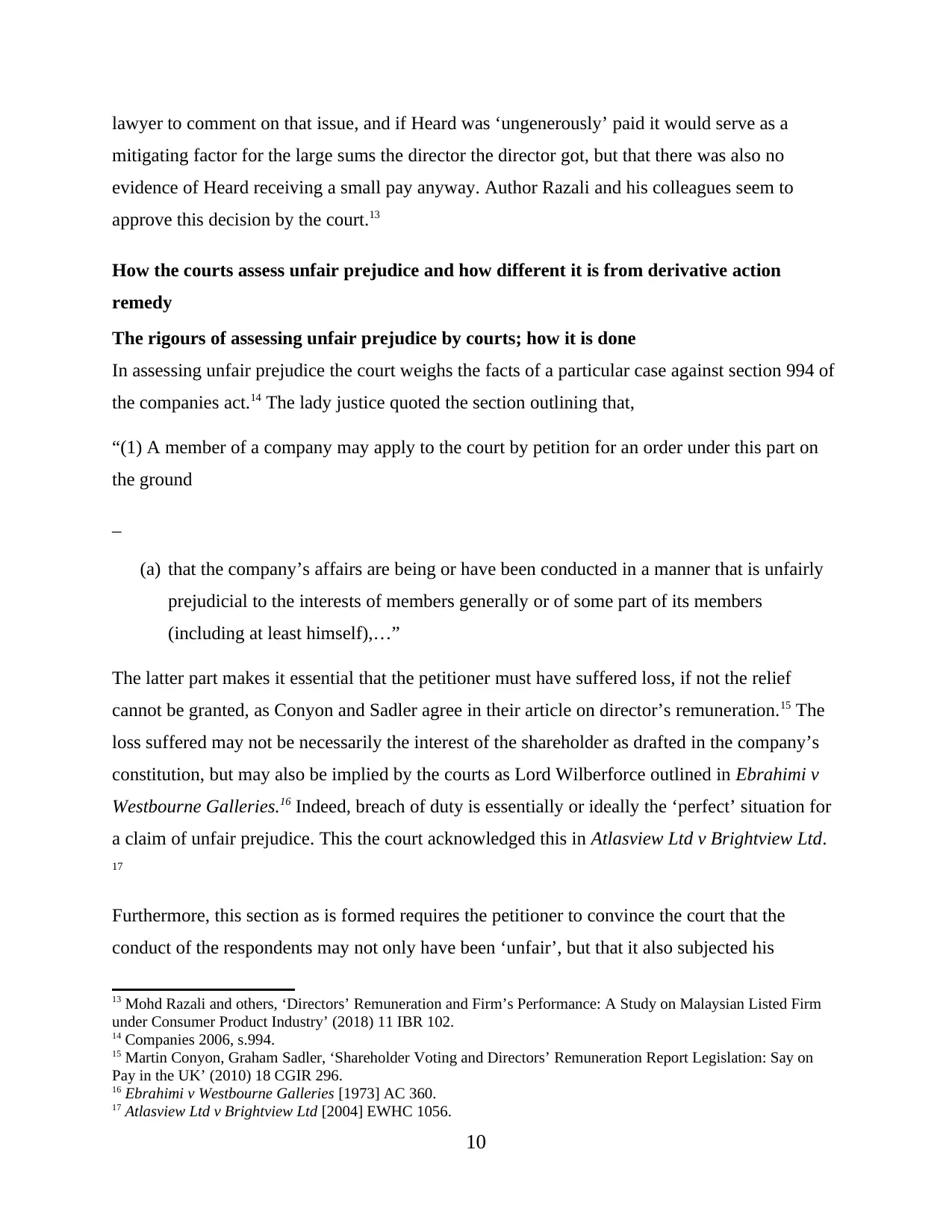
lawyer to comment on that issue, and if Heard was ‘ungenerously’ paid it would serve as a
mitigating factor for the large sums the director the director got, but that there was also no
evidence of Heard receiving a small pay anyway. Author Razali and his colleagues seem to
approve this decision by the court.13
How the courts assess unfair prejudice and how different it is from derivative action
remedy
The rigours of assessing unfair prejudice by courts; how it is done
In assessing unfair prejudice the court weighs the facts of a particular case against section 994 of
the companies act.14 The lady justice quoted the section outlining that,
“(1) A member of a company may apply to the court by petition for an order under this part on
the ground
_
(a) that the company’s affairs are being or have been conducted in a manner that is unfairly
prejudicial to the interests of members generally or of some part of its members
(including at least himself),…”
The latter part makes it essential that the petitioner must have suffered loss, if not the relief
cannot be granted, as Conyon and Sadler agree in their article on director’s remuneration.15 The
loss suffered may not be necessarily the interest of the shareholder as drafted in the company’s
constitution, but may also be implied by the courts as Lord Wilberforce outlined in Ebrahimi v
Westbourne Galleries.16 Indeed, breach of duty is essentially or ideally the ‘perfect’ situation for
a claim of unfair prejudice. This the court acknowledged this in Atlasview Ltd v Brightview Ltd.
17
Furthermore, this section as is formed requires the petitioner to convince the court that the
conduct of the respondents may not only have been ‘unfair’, but that it also subjected his
13 Mohd Razali and others, ‘Directors’ Remuneration and Firm’s Performance: A Study on Malaysian Listed Firm
under Consumer Product Industry’ (2018) 11 IBR 102.
14 Companies 2006, s.994.
15 Martin Conyon, Graham Sadler, ‘Shareholder Voting and Directors’ Remuneration Report Legislation: Say on
Pay in the UK’ (2010) 18 CGIR 296.
16 Ebrahimi v Westbourne Galleries [1973] AC 360.
17 Atlasview Ltd v Brightview Ltd [2004] EWHC 1056.
10
mitigating factor for the large sums the director the director got, but that there was also no
evidence of Heard receiving a small pay anyway. Author Razali and his colleagues seem to
approve this decision by the court.13
How the courts assess unfair prejudice and how different it is from derivative action
remedy
The rigours of assessing unfair prejudice by courts; how it is done
In assessing unfair prejudice the court weighs the facts of a particular case against section 994 of
the companies act.14 The lady justice quoted the section outlining that,
“(1) A member of a company may apply to the court by petition for an order under this part on
the ground
_
(a) that the company’s affairs are being or have been conducted in a manner that is unfairly
prejudicial to the interests of members generally or of some part of its members
(including at least himself),…”
The latter part makes it essential that the petitioner must have suffered loss, if not the relief
cannot be granted, as Conyon and Sadler agree in their article on director’s remuneration.15 The
loss suffered may not be necessarily the interest of the shareholder as drafted in the company’s
constitution, but may also be implied by the courts as Lord Wilberforce outlined in Ebrahimi v
Westbourne Galleries.16 Indeed, breach of duty is essentially or ideally the ‘perfect’ situation for
a claim of unfair prejudice. This the court acknowledged this in Atlasview Ltd v Brightview Ltd.
17
Furthermore, this section as is formed requires the petitioner to convince the court that the
conduct of the respondents may not only have been ‘unfair’, but that it also subjected his
13 Mohd Razali and others, ‘Directors’ Remuneration and Firm’s Performance: A Study on Malaysian Listed Firm
under Consumer Product Industry’ (2018) 11 IBR 102.
14 Companies 2006, s.994.
15 Martin Conyon, Graham Sadler, ‘Shareholder Voting and Directors’ Remuneration Report Legislation: Say on
Pay in the UK’ (2010) 18 CGIR 296.
16 Ebrahimi v Westbourne Galleries [1973] AC 360.
17 Atlasview Ltd v Brightview Ltd [2004] EWHC 1056.
10
Secure Best Marks with AI Grader
Need help grading? Try our AI Grader for instant feedback on your assignments.
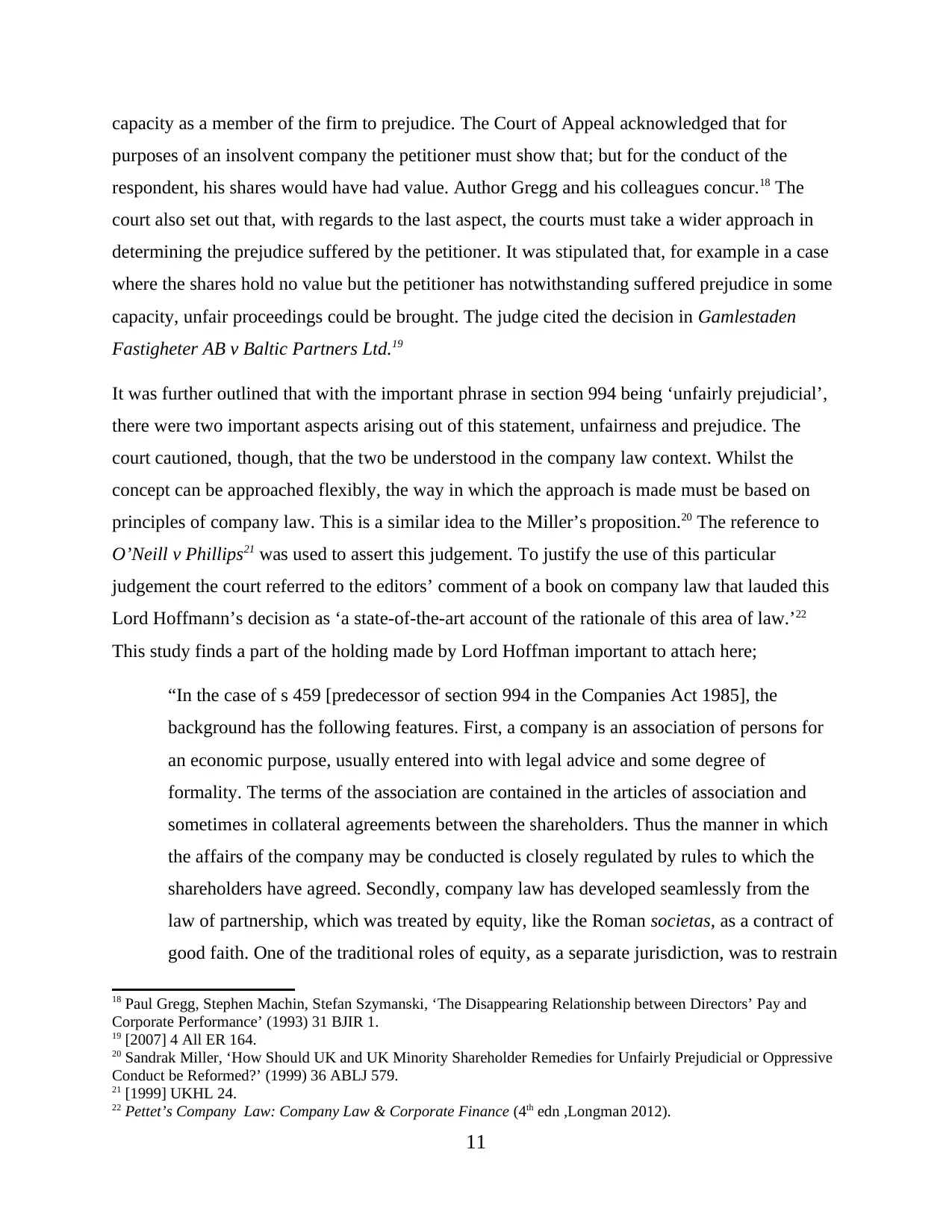
capacity as a member of the firm to prejudice. The Court of Appeal acknowledged that for
purposes of an insolvent company the petitioner must show that; but for the conduct of the
respondent, his shares would have had value. Author Gregg and his colleagues concur.18 The
court also set out that, with regards to the last aspect, the courts must take a wider approach in
determining the prejudice suffered by the petitioner. It was stipulated that, for example in a case
where the shares hold no value but the petitioner has notwithstanding suffered prejudice in some
capacity, unfair proceedings could be brought. The judge cited the decision in Gamlestaden
Fastigheter AB v Baltic Partners Ltd.19
It was further outlined that with the important phrase in section 994 being ‘unfairly prejudicial’,
there were two important aspects arising out of this statement, unfairness and prejudice. The
court cautioned, though, that the two be understood in the company law context. Whilst the
concept can be approached flexibly, the way in which the approach is made must be based on
principles of company law. This is a similar idea to the Miller’s proposition.20 The reference to
O’Neill v Phillips21 was used to assert this judgement. To justify the use of this particular
judgement the court referred to the editors’ comment of a book on company law that lauded this
Lord Hoffmann’s decision as ‘a state-of-the-art account of the rationale of this area of law.’22
This study finds a part of the holding made by Lord Hoffman important to attach here;
“In the case of s 459 [predecessor of section 994 in the Companies Act 1985], the
background has the following features. First, a company is an association of persons for
an economic purpose, usually entered into with legal advice and some degree of
formality. The terms of the association are contained in the articles of association and
sometimes in collateral agreements between the shareholders. Thus the manner in which
the affairs of the company may be conducted is closely regulated by rules to which the
shareholders have agreed. Secondly, company law has developed seamlessly from the
law of partnership, which was treated by equity, like the Roman societas, as a contract of
good faith. One of the traditional roles of equity, as a separate jurisdiction, was to restrain
18 Paul Gregg, Stephen Machin, Stefan Szymanski, ‘The Disappearing Relationship between Directors’ Pay and
Corporate Performance’ (1993) 31 BJIR 1.
19 [2007] 4 All ER 164.
20 Sandrak Miller, ‘How Should UK and UK Minority Shareholder Remedies for Unfairly Prejudicial or Oppressive
Conduct be Reformed?’ (1999) 36 ABLJ 579.
21 [1999] UKHL 24.
22 Pettet’s Company Law: Company Law & Corporate Finance (4th edn ,Longman 2012).
11
purposes of an insolvent company the petitioner must show that; but for the conduct of the
respondent, his shares would have had value. Author Gregg and his colleagues concur.18 The
court also set out that, with regards to the last aspect, the courts must take a wider approach in
determining the prejudice suffered by the petitioner. It was stipulated that, for example in a case
where the shares hold no value but the petitioner has notwithstanding suffered prejudice in some
capacity, unfair proceedings could be brought. The judge cited the decision in Gamlestaden
Fastigheter AB v Baltic Partners Ltd.19
It was further outlined that with the important phrase in section 994 being ‘unfairly prejudicial’,
there were two important aspects arising out of this statement, unfairness and prejudice. The
court cautioned, though, that the two be understood in the company law context. Whilst the
concept can be approached flexibly, the way in which the approach is made must be based on
principles of company law. This is a similar idea to the Miller’s proposition.20 The reference to
O’Neill v Phillips21 was used to assert this judgement. To justify the use of this particular
judgement the court referred to the editors’ comment of a book on company law that lauded this
Lord Hoffmann’s decision as ‘a state-of-the-art account of the rationale of this area of law.’22
This study finds a part of the holding made by Lord Hoffman important to attach here;
“In the case of s 459 [predecessor of section 994 in the Companies Act 1985], the
background has the following features. First, a company is an association of persons for
an economic purpose, usually entered into with legal advice and some degree of
formality. The terms of the association are contained in the articles of association and
sometimes in collateral agreements between the shareholders. Thus the manner in which
the affairs of the company may be conducted is closely regulated by rules to which the
shareholders have agreed. Secondly, company law has developed seamlessly from the
law of partnership, which was treated by equity, like the Roman societas, as a contract of
good faith. One of the traditional roles of equity, as a separate jurisdiction, was to restrain
18 Paul Gregg, Stephen Machin, Stefan Szymanski, ‘The Disappearing Relationship between Directors’ Pay and
Corporate Performance’ (1993) 31 BJIR 1.
19 [2007] 4 All ER 164.
20 Sandrak Miller, ‘How Should UK and UK Minority Shareholder Remedies for Unfairly Prejudicial or Oppressive
Conduct be Reformed?’ (1999) 36 ABLJ 579.
21 [1999] UKHL 24.
22 Pettet’s Company Law: Company Law & Corporate Finance (4th edn ,Longman 2012).
11
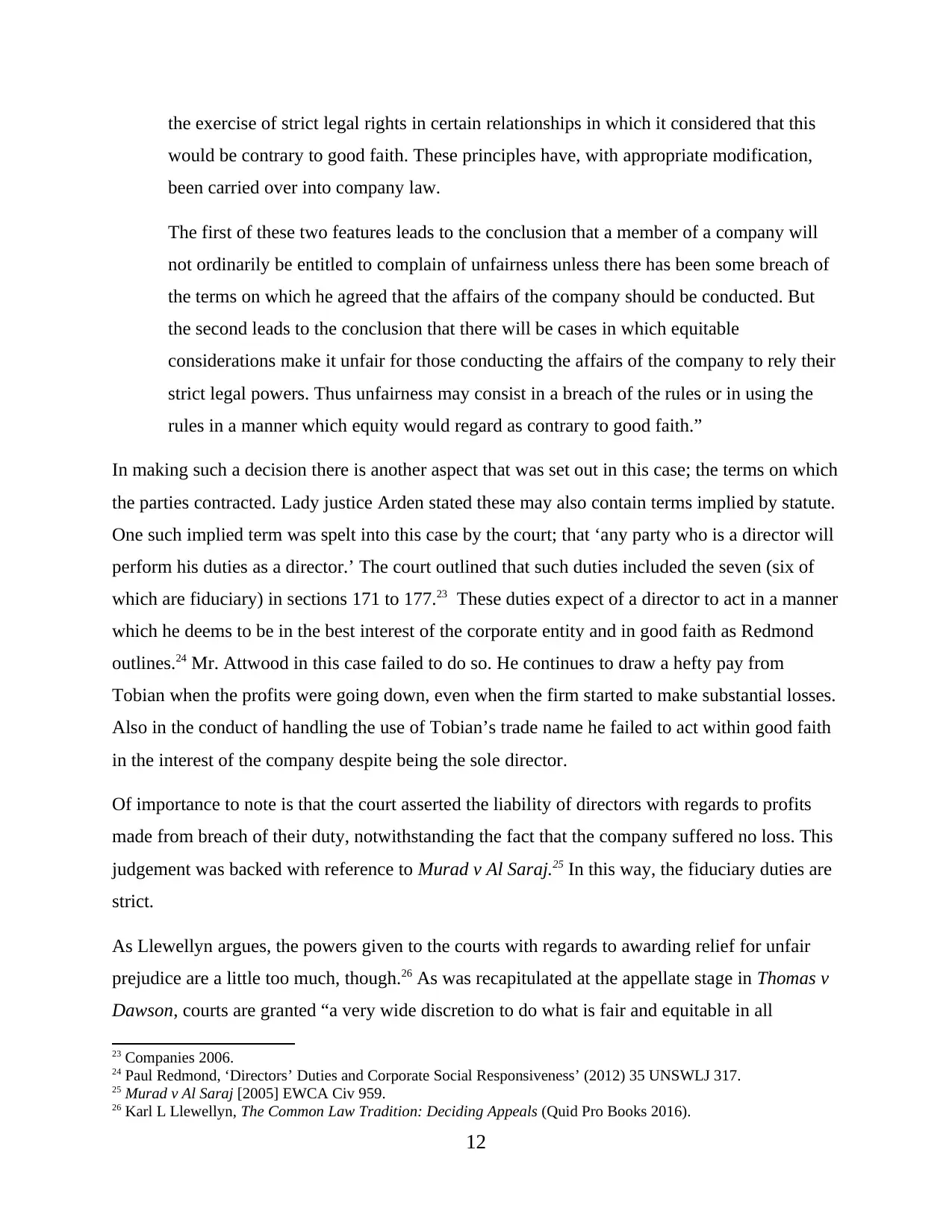
the exercise of strict legal rights in certain relationships in which it considered that this
would be contrary to good faith. These principles have, with appropriate modification,
been carried over into company law.
The first of these two features leads to the conclusion that a member of a company will
not ordinarily be entitled to complain of unfairness unless there has been some breach of
the terms on which he agreed that the affairs of the company should be conducted. But
the second leads to the conclusion that there will be cases in which equitable
considerations make it unfair for those conducting the affairs of the company to rely their
strict legal powers. Thus unfairness may consist in a breach of the rules or in using the
rules in a manner which equity would regard as contrary to good faith.”
In making such a decision there is another aspect that was set out in this case; the terms on which
the parties contracted. Lady justice Arden stated these may also contain terms implied by statute.
One such implied term was spelt into this case by the court; that ‘any party who is a director will
perform his duties as a director.’ The court outlined that such duties included the seven (six of
which are fiduciary) in sections 171 to 177.23 These duties expect of a director to act in a manner
which he deems to be in the best interest of the corporate entity and in good faith as Redmond
outlines.24 Mr. Attwood in this case failed to do so. He continues to draw a hefty pay from
Tobian when the profits were going down, even when the firm started to make substantial losses.
Also in the conduct of handling the use of Tobian’s trade name he failed to act within good faith
in the interest of the company despite being the sole director.
Of importance to note is that the court asserted the liability of directors with regards to profits
made from breach of their duty, notwithstanding the fact that the company suffered no loss. This
judgement was backed with reference to Murad v Al Saraj.25 In this way, the fiduciary duties are
strict.
As Llewellyn argues, the powers given to the courts with regards to awarding relief for unfair
prejudice are a little too much, though.26 As was recapitulated at the appellate stage in Thomas v
Dawson, courts are granted “a very wide discretion to do what is fair and equitable in all
23 Companies 2006.
24 Paul Redmond, ‘Directors’ Duties and Corporate Social Responsiveness’ (2012) 35 UNSWLJ 317.
25 Murad v Al Saraj [2005] EWCA Civ 959.
26 Karl L Llewellyn, The Common Law Tradition: Deciding Appeals (Quid Pro Books 2016).
12
would be contrary to good faith. These principles have, with appropriate modification,
been carried over into company law.
The first of these two features leads to the conclusion that a member of a company will
not ordinarily be entitled to complain of unfairness unless there has been some breach of
the terms on which he agreed that the affairs of the company should be conducted. But
the second leads to the conclusion that there will be cases in which equitable
considerations make it unfair for those conducting the affairs of the company to rely their
strict legal powers. Thus unfairness may consist in a breach of the rules or in using the
rules in a manner which equity would regard as contrary to good faith.”
In making such a decision there is another aspect that was set out in this case; the terms on which
the parties contracted. Lady justice Arden stated these may also contain terms implied by statute.
One such implied term was spelt into this case by the court; that ‘any party who is a director will
perform his duties as a director.’ The court outlined that such duties included the seven (six of
which are fiduciary) in sections 171 to 177.23 These duties expect of a director to act in a manner
which he deems to be in the best interest of the corporate entity and in good faith as Redmond
outlines.24 Mr. Attwood in this case failed to do so. He continues to draw a hefty pay from
Tobian when the profits were going down, even when the firm started to make substantial losses.
Also in the conduct of handling the use of Tobian’s trade name he failed to act within good faith
in the interest of the company despite being the sole director.
Of importance to note is that the court asserted the liability of directors with regards to profits
made from breach of their duty, notwithstanding the fact that the company suffered no loss. This
judgement was backed with reference to Murad v Al Saraj.25 In this way, the fiduciary duties are
strict.
As Llewellyn argues, the powers given to the courts with regards to awarding relief for unfair
prejudice are a little too much, though.26 As was recapitulated at the appellate stage in Thomas v
Dawson, courts are granted “a very wide discretion to do what is fair and equitable in all
23 Companies 2006.
24 Paul Redmond, ‘Directors’ Duties and Corporate Social Responsiveness’ (2012) 35 UNSWLJ 317.
25 Murad v Al Saraj [2005] EWCA Civ 959.
26 Karl L Llewellyn, The Common Law Tradition: Deciding Appeals (Quid Pro Books 2016).
12
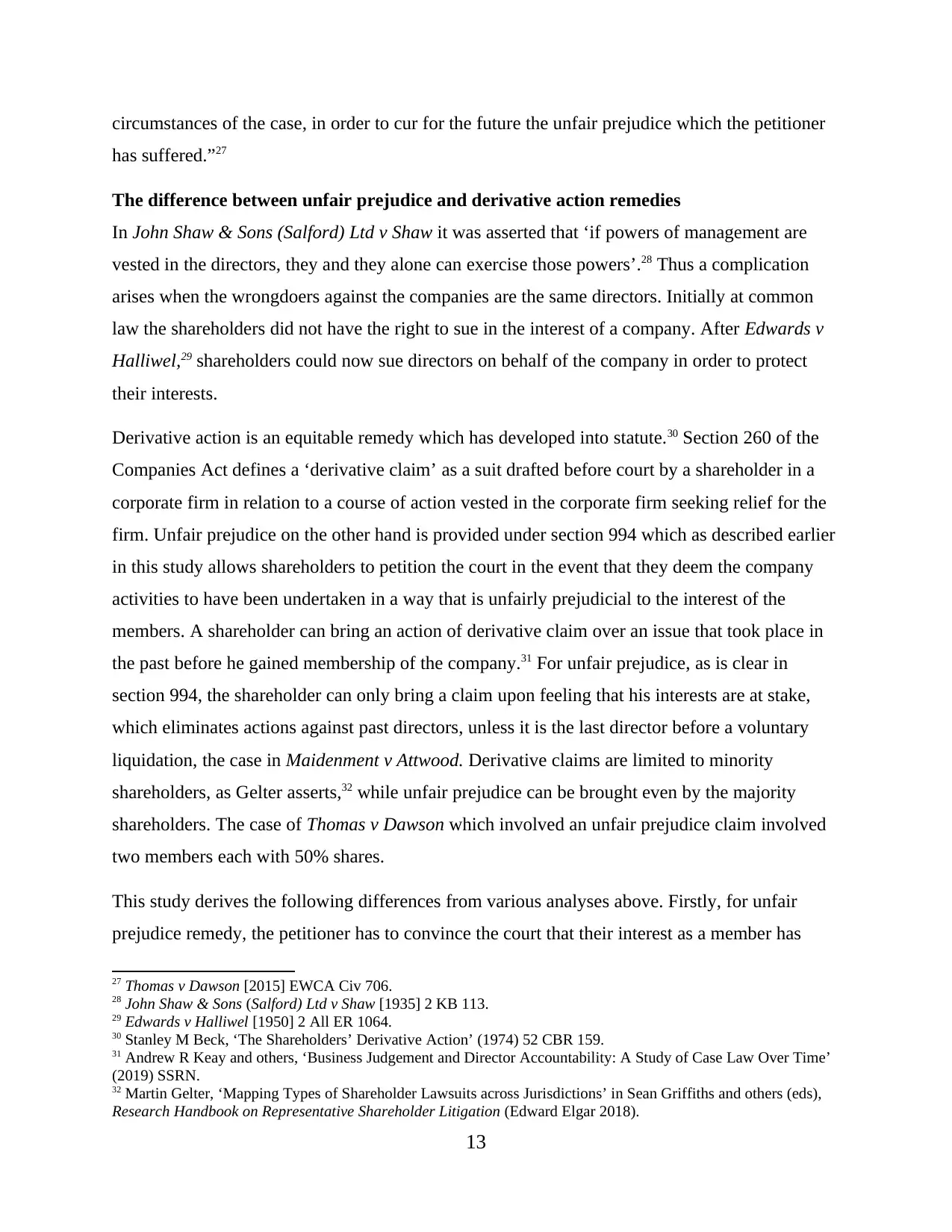
circumstances of the case, in order to cur for the future the unfair prejudice which the petitioner
has suffered.”27
The difference between unfair prejudice and derivative action remedies
In John Shaw & Sons (Salford) Ltd v Shaw it was asserted that ‘if powers of management are
vested in the directors, they and they alone can exercise those powers’.28 Thus a complication
arises when the wrongdoers against the companies are the same directors. Initially at common
law the shareholders did not have the right to sue in the interest of a company. After Edwards v
Halliwel,29 shareholders could now sue directors on behalf of the company in order to protect
their interests.
Derivative action is an equitable remedy which has developed into statute.30 Section 260 of the
Companies Act defines a ‘derivative claim’ as a suit drafted before court by a shareholder in a
corporate firm in relation to a course of action vested in the corporate firm seeking relief for the
firm. Unfair prejudice on the other hand is provided under section 994 which as described earlier
in this study allows shareholders to petition the court in the event that they deem the company
activities to have been undertaken in a way that is unfairly prejudicial to the interest of the
members. A shareholder can bring an action of derivative claim over an issue that took place in
the past before he gained membership of the company.31 For unfair prejudice, as is clear in
section 994, the shareholder can only bring a claim upon feeling that his interests are at stake,
which eliminates actions against past directors, unless it is the last director before a voluntary
liquidation, the case in Maidenment v Attwood. Derivative claims are limited to minority
shareholders, as Gelter asserts,32 while unfair prejudice can be brought even by the majority
shareholders. The case of Thomas v Dawson which involved an unfair prejudice claim involved
two members each with 50% shares.
This study derives the following differences from various analyses above. Firstly, for unfair
prejudice remedy, the petitioner has to convince the court that their interest as a member has
27 Thomas v Dawson [2015] EWCA Civ 706.
28 John Shaw & Sons (Salford) Ltd v Shaw [1935] 2 KB 113.
29 Edwards v Halliwel [1950] 2 All ER 1064.
30 Stanley M Beck, ‘The Shareholders’ Derivative Action’ (1974) 52 CBR 159.
31 Andrew R Keay and others, ‘Business Judgement and Director Accountability: A Study of Case Law Over Time’
(2019) SSRN.
32 Martin Gelter, ‘Mapping Types of Shareholder Lawsuits across Jurisdictions’ in Sean Griffiths and others (eds),
Research Handbook on Representative Shareholder Litigation (Edward Elgar 2018).
13
has suffered.”27
The difference between unfair prejudice and derivative action remedies
In John Shaw & Sons (Salford) Ltd v Shaw it was asserted that ‘if powers of management are
vested in the directors, they and they alone can exercise those powers’.28 Thus a complication
arises when the wrongdoers against the companies are the same directors. Initially at common
law the shareholders did not have the right to sue in the interest of a company. After Edwards v
Halliwel,29 shareholders could now sue directors on behalf of the company in order to protect
their interests.
Derivative action is an equitable remedy which has developed into statute.30 Section 260 of the
Companies Act defines a ‘derivative claim’ as a suit drafted before court by a shareholder in a
corporate firm in relation to a course of action vested in the corporate firm seeking relief for the
firm. Unfair prejudice on the other hand is provided under section 994 which as described earlier
in this study allows shareholders to petition the court in the event that they deem the company
activities to have been undertaken in a way that is unfairly prejudicial to the interest of the
members. A shareholder can bring an action of derivative claim over an issue that took place in
the past before he gained membership of the company.31 For unfair prejudice, as is clear in
section 994, the shareholder can only bring a claim upon feeling that his interests are at stake,
which eliminates actions against past directors, unless it is the last director before a voluntary
liquidation, the case in Maidenment v Attwood. Derivative claims are limited to minority
shareholders, as Gelter asserts,32 while unfair prejudice can be brought even by the majority
shareholders. The case of Thomas v Dawson which involved an unfair prejudice claim involved
two members each with 50% shares.
This study derives the following differences from various analyses above. Firstly, for unfair
prejudice remedy, the petitioner has to convince the court that their interest as a member has
27 Thomas v Dawson [2015] EWCA Civ 706.
28 John Shaw & Sons (Salford) Ltd v Shaw [1935] 2 KB 113.
29 Edwards v Halliwel [1950] 2 All ER 1064.
30 Stanley M Beck, ‘The Shareholders’ Derivative Action’ (1974) 52 CBR 159.
31 Andrew R Keay and others, ‘Business Judgement and Director Accountability: A Study of Case Law Over Time’
(2019) SSRN.
32 Martin Gelter, ‘Mapping Types of Shareholder Lawsuits across Jurisdictions’ in Sean Griffiths and others (eds),
Research Handbook on Representative Shareholder Litigation (Edward Elgar 2018).
13
Paraphrase This Document
Need a fresh take? Get an instant paraphrase of this document with our AI Paraphraser
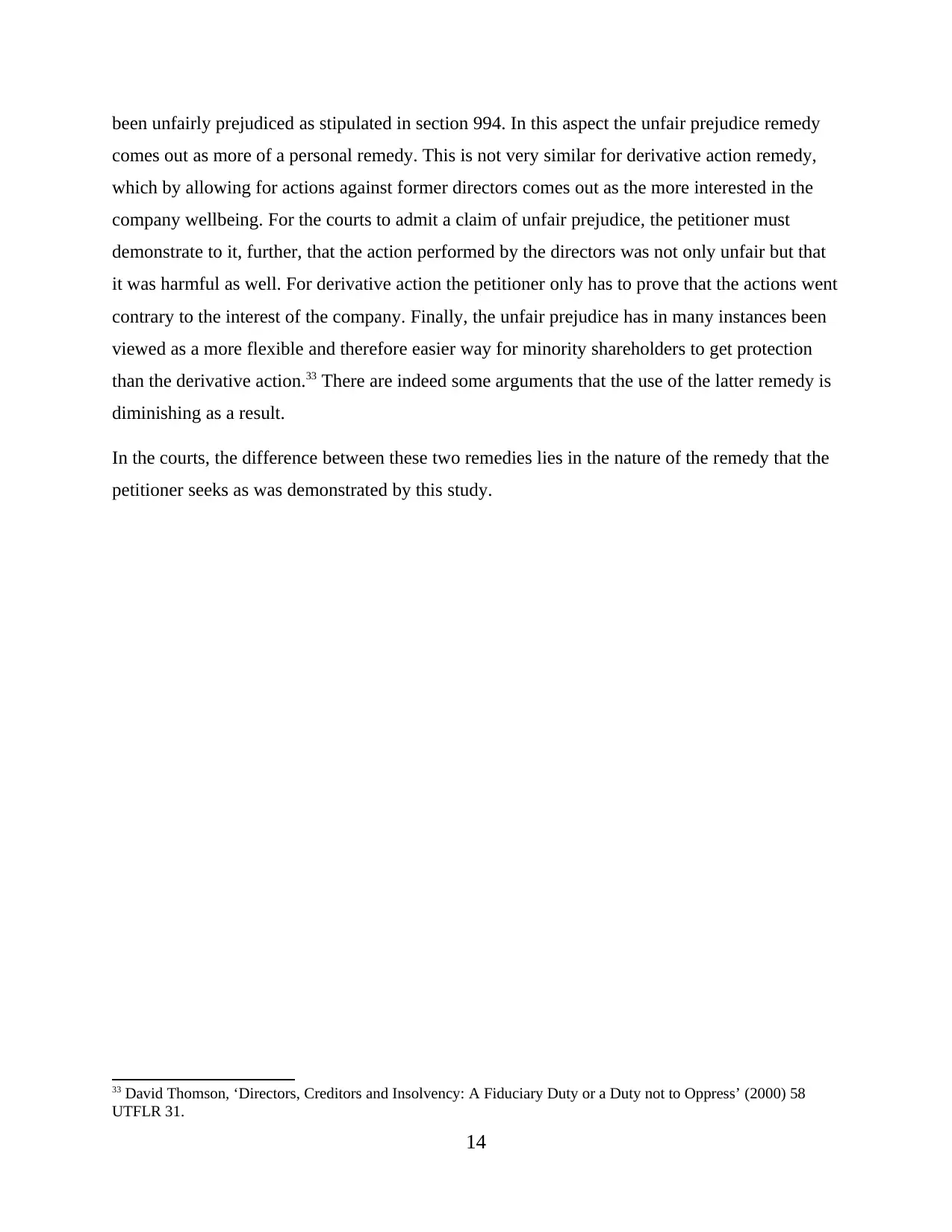
been unfairly prejudiced as stipulated in section 994. In this aspect the unfair prejudice remedy
comes out as more of a personal remedy. This is not very similar for derivative action remedy,
which by allowing for actions against former directors comes out as the more interested in the
company wellbeing. For the courts to admit a claim of unfair prejudice, the petitioner must
demonstrate to it, further, that the action performed by the directors was not only unfair but that
it was harmful as well. For derivative action the petitioner only has to prove that the actions went
contrary to the interest of the company. Finally, the unfair prejudice has in many instances been
viewed as a more flexible and therefore easier way for minority shareholders to get protection
than the derivative action.33 There are indeed some arguments that the use of the latter remedy is
diminishing as a result.
In the courts, the difference between these two remedies lies in the nature of the remedy that the
petitioner seeks as was demonstrated by this study.
33 David Thomson, ‘Directors, Creditors and Insolvency: A Fiduciary Duty or a Duty not to Oppress’ (2000) 58
UTFLR 31.
14
comes out as more of a personal remedy. This is not very similar for derivative action remedy,
which by allowing for actions against former directors comes out as the more interested in the
company wellbeing. For the courts to admit a claim of unfair prejudice, the petitioner must
demonstrate to it, further, that the action performed by the directors was not only unfair but that
it was harmful as well. For derivative action the petitioner only has to prove that the actions went
contrary to the interest of the company. Finally, the unfair prejudice has in many instances been
viewed as a more flexible and therefore easier way for minority shareholders to get protection
than the derivative action.33 There are indeed some arguments that the use of the latter remedy is
diminishing as a result.
In the courts, the difference between these two remedies lies in the nature of the remedy that the
petitioner seeks as was demonstrated by this study.
33 David Thomson, ‘Directors, Creditors and Insolvency: A Fiduciary Duty or a Duty not to Oppress’ (2000) 58
UTFLR 31.
14
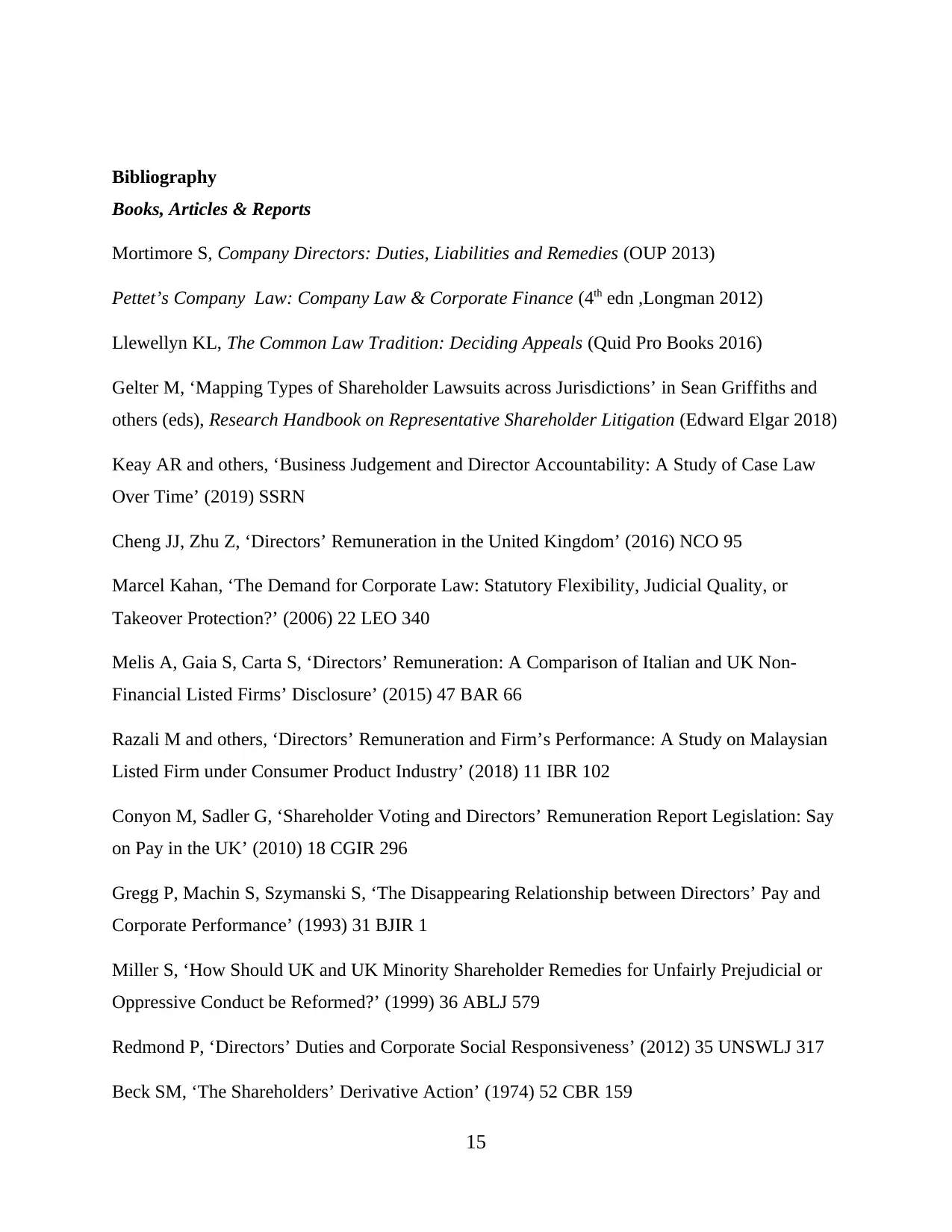
Bibliography
Books, Articles & Reports
Mortimore S, Company Directors: Duties, Liabilities and Remedies (OUP 2013)
Pettet’s Company Law: Company Law & Corporate Finance (4th edn ,Longman 2012)
Llewellyn KL, The Common Law Tradition: Deciding Appeals (Quid Pro Books 2016)
Gelter M, ‘Mapping Types of Shareholder Lawsuits across Jurisdictions’ in Sean Griffiths and
others (eds), Research Handbook on Representative Shareholder Litigation (Edward Elgar 2018)
Keay AR and others, ‘Business Judgement and Director Accountability: A Study of Case Law
Over Time’ (2019) SSRN
Cheng JJ, Zhu Z, ‘Directors’ Remuneration in the United Kingdom’ (2016) NCO 95
Marcel Kahan, ‘The Demand for Corporate Law: Statutory Flexibility, Judicial Quality, or
Takeover Protection?’ (2006) 22 LEO 340
Melis A, Gaia S, Carta S, ‘Directors’ Remuneration: A Comparison of Italian and UK Non-
Financial Listed Firms’ Disclosure’ (2015) 47 BAR 66
Razali M and others, ‘Directors’ Remuneration and Firm’s Performance: A Study on Malaysian
Listed Firm under Consumer Product Industry’ (2018) 11 IBR 102
Conyon M, Sadler G, ‘Shareholder Voting and Directors’ Remuneration Report Legislation: Say
on Pay in the UK’ (2010) 18 CGIR 296
Gregg P, Machin S, Szymanski S, ‘The Disappearing Relationship between Directors’ Pay and
Corporate Performance’ (1993) 31 BJIR 1
Miller S, ‘How Should UK and UK Minority Shareholder Remedies for Unfairly Prejudicial or
Oppressive Conduct be Reformed?’ (1999) 36 ABLJ 579
Redmond P, ‘Directors’ Duties and Corporate Social Responsiveness’ (2012) 35 UNSWLJ 317
Beck SM, ‘The Shareholders’ Derivative Action’ (1974) 52 CBR 159
15
Books, Articles & Reports
Mortimore S, Company Directors: Duties, Liabilities and Remedies (OUP 2013)
Pettet’s Company Law: Company Law & Corporate Finance (4th edn ,Longman 2012)
Llewellyn KL, The Common Law Tradition: Deciding Appeals (Quid Pro Books 2016)
Gelter M, ‘Mapping Types of Shareholder Lawsuits across Jurisdictions’ in Sean Griffiths and
others (eds), Research Handbook on Representative Shareholder Litigation (Edward Elgar 2018)
Keay AR and others, ‘Business Judgement and Director Accountability: A Study of Case Law
Over Time’ (2019) SSRN
Cheng JJ, Zhu Z, ‘Directors’ Remuneration in the United Kingdom’ (2016) NCO 95
Marcel Kahan, ‘The Demand for Corporate Law: Statutory Flexibility, Judicial Quality, or
Takeover Protection?’ (2006) 22 LEO 340
Melis A, Gaia S, Carta S, ‘Directors’ Remuneration: A Comparison of Italian and UK Non-
Financial Listed Firms’ Disclosure’ (2015) 47 BAR 66
Razali M and others, ‘Directors’ Remuneration and Firm’s Performance: A Study on Malaysian
Listed Firm under Consumer Product Industry’ (2018) 11 IBR 102
Conyon M, Sadler G, ‘Shareholder Voting and Directors’ Remuneration Report Legislation: Say
on Pay in the UK’ (2010) 18 CGIR 296
Gregg P, Machin S, Szymanski S, ‘The Disappearing Relationship between Directors’ Pay and
Corporate Performance’ (1993) 31 BJIR 1
Miller S, ‘How Should UK and UK Minority Shareholder Remedies for Unfairly Prejudicial or
Oppressive Conduct be Reformed?’ (1999) 36 ABLJ 579
Redmond P, ‘Directors’ Duties and Corporate Social Responsiveness’ (2012) 35 UNSWLJ 317
Beck SM, ‘The Shareholders’ Derivative Action’ (1974) 52 CBR 159
15
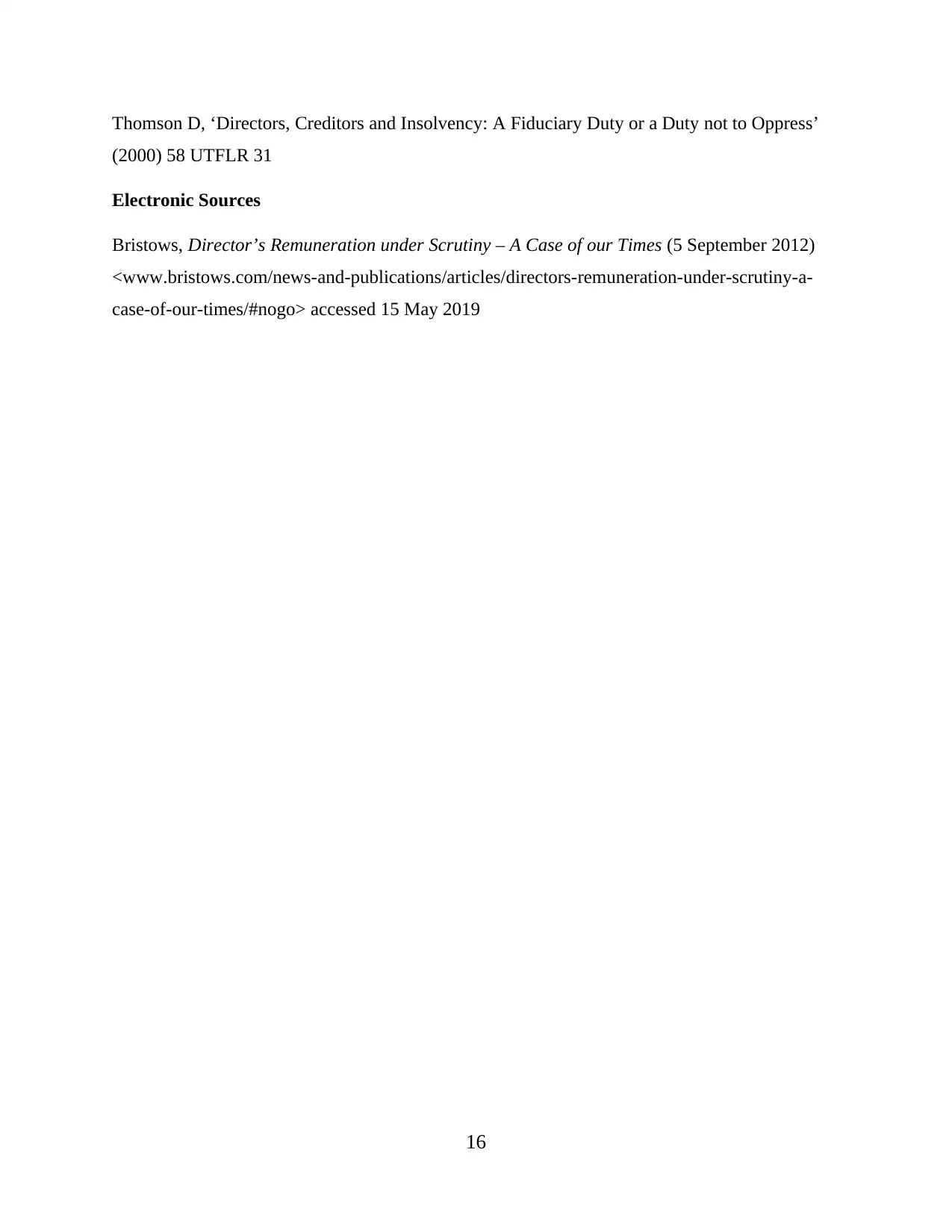
Thomson D, ‘Directors, Creditors and Insolvency: A Fiduciary Duty or a Duty not to Oppress’
(2000) 58 UTFLR 31
Electronic Sources
Bristows, Director’s Remuneration under Scrutiny – A Case of our Times (5 September 2012)
<www.bristows.com/news-and-publications/articles/directors-remuneration-under-scrutiny-a-
case-of-our-times/#nogo> accessed 15 May 2019
16
(2000) 58 UTFLR 31
Electronic Sources
Bristows, Director’s Remuneration under Scrutiny – A Case of our Times (5 September 2012)
<www.bristows.com/news-and-publications/articles/directors-remuneration-under-scrutiny-a-
case-of-our-times/#nogo> accessed 15 May 2019
16
1 out of 16
Your All-in-One AI-Powered Toolkit for Academic Success.
+13062052269
info@desklib.com
Available 24*7 on WhatsApp / Email
![[object Object]](/_next/static/media/star-bottom.7253800d.svg)
Unlock your academic potential
© 2024 | Zucol Services PVT LTD | All rights reserved.